Deciding where to live is no easy task, if you’re wondering whether to take the plunge and move to Arizona, you’ve come to the right place!
As a leading home builder of new construction homes in Arizona, we understand the attraction of the Grand Canyon State’s sunshine, beautiful landscapes, and unique lifestyle. However, making an informed decision requires a balanced perspective. So while Arizona’s climate and scenery have made it a popular relocation destination, will it be the right fit for you?
In this comprehensive guide, we’ll explore more than just the perks; we’re going to dive deep into the pros and cons of living in Arizona, without the sugarcoating, and offer a balanced perspective to help you decide if Arizona is a good place to live – for you.
So pack your bags, embrace the sunshine, and get ready to discover Arizona–including the reasons behind its booming popularity, and the unique advantages of choosing a brand-new construction home in the Grand Canyon State.
The Great State of Arizona
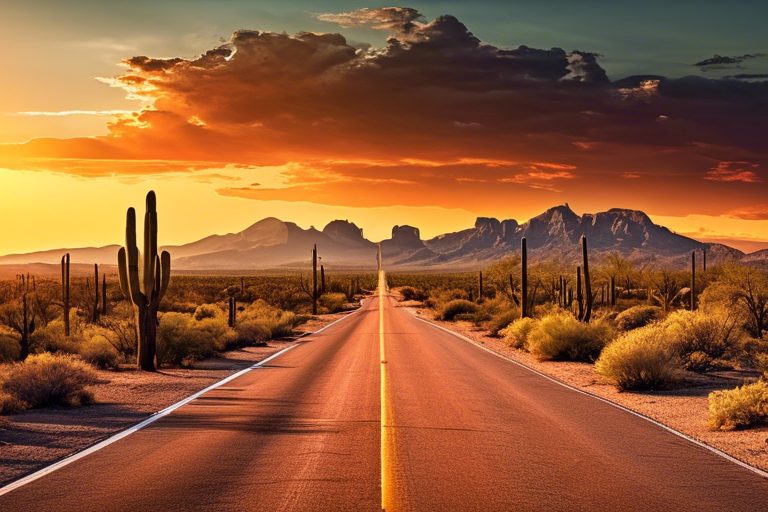
Arizona has become an increasingly popular relocation destination, particularly for those seeking warm weather, beautiful scenery, and a growing economy. It consistently ranks highly in national migration studies, with Phoenix being one of the top relocation destinations for Arizona homebuyers.
As the 6th largest state in the United States, Arizona boasts a population of approximately 7.4 million people with its bustling capital, Phoenix, at the epicenter. Arizona is celebrated for its breathtaking natural attractions, including the iconic Grand Canyon, the sprawling Sonoran Desert, and its picturesque mountain ranges. Its diverse economy is fueled by thriving sectors including healthcare, education, tourism, and agriculture, making Arizona a compelling option consideration for those pondering life in the Southwest.
Interested in buying a new home in Arizona? Check out our New Homebuyers Guide to Arizona!
Is Arizona a Good Place to Live?
Yes, Arizona can be a great place to live if you crave sunshine, outdoor adventure, and a growing economy with a relaxed, laid-back lifestyle. With a unique blend of breathtaking natural beauty, warm weather, and cultural diversity, Arizona has become a desirable place to live for many. On the other hand, the scorching summer heat, dry climate, and transportation limitations can be challenging for some.
So is Arizona truly a good place to live? Let’s explore the factors that make moving to Arizona so appealing and examine the demographics of those choosing to call it home.
Appeal of Arizona: Why Do People Want to Move to Arizona?
People live in Arizona for its sunny weather, abundant recreational opportunities, strong job market, and cultural richness. There’s no question that the Grand Canyon State offers a unique blend of natural beauty, outdoor activities, and economic advantages. Here’s a glimpse into what makes it so attractive:
- Climate: Sunshine seekers rejoice! Arizona boasts warm weather for most of the year, ideal for outdoor enthusiasts and those escaping harsher winters.
- Outdoor Adventure: From hiking the Grand Canyon to skiing in the mountains, Arizona caters to adventurers of all levels.
- Thriving Economy: Key industries like technology, healthcare, and tourism are driving Arizona’s economic growth, creating job opportunities.
- Cultural Tapestry: Arizona’s rich history and diverse population create a vibrant cultural landscape. From Native American reservations to bustling metropolitan areas like Phoenix, the state offers a unique blend of traditions and experiences.
Thinking of making the move to Arizona? Check out the 10 Things You Should Consider When Buying a New Home in Arizona
Demographics & Migration Trends: Who’s Moving to Arizona and Why?
Arizona’s population growth reflects its appeal. Retirees seeking sunny escapes and young professionals drawn to a booming job market are two of the most significant demographic groups relocating to the state.
Here’s a breakdown of some key migration trends:
- Retirees: Arizona’s warm climate and active lifestyle options make it a haven for retirees seeking a vibrant next chapter.
- Young Professionals: The growing job market in Arizona’s major cities is a magnet for young professionals seeking career opportunities and a dynamic lifestyle.
- Families: Arizona offers a family-friendly environment, with plenty of outdoor activities and a growing network of schools.
- Remote Workers: The rise of remote work allows people to enjoy Arizona’s sunshine all year long, with many remote workers moving to Arizona for its warm weather.
However, it’s important to consider factors beyond Arizona’s initial appeal. Researching job prospects in your field, understanding the housing market in your desired area, and considering access to healthcare and educational opportunities are crucial steps before you make the move.
Ultimately, whether or not Arizona is a good place to live depends on your individual priorities and lifestyle. Do your research, weigh the pros and cons of living in Arizona, and visit the state to experience its unique charm firsthand.
Already know Arizona’s right for you? Browse our selection of new homes in Arizona. Still unsure? Keep reading to learn about the pros and cons of Arizona living, and the perks and benefits of purchasing a new construction home.
Pros and Cons of Living in Arizona

Pros of Living in Arizona
There are plenty of pros when it comes to life in Arizona — often celebrated for its breathtaking landscapes and warm climate, offers a myriad of advantages for those considering calling it home. Here are some of the key benefits of living in Arizona:
- Exceptional Weather and Climate: Residents relish the state’s warm and sunny climate, with an average of around 300 sunny days per year. The mild winters are particularly appealing, with temperatures often in the comfortable 70s, while the higher mountains may offer a rare glimpse of snow. However, it’s worth noting that summers can bring intense heat, with temperatures soaring above 100°F for several months.
- Natural Beauty and Outdoor Recreation: Arizona’s natural splendor is unmatched, from the iconic Grand Canyon to Petrified Forest National Park, to the world-famous Sonoran Desert and other unique desert vistas. Outdoor enthusiasts will find no shortage of activities, including hiking, biking, climbing, and golfing, all set against the backdrop of teeming biodiversity and stunning sunsets.
- Cultural Diversity: Arizona is a tapestry of cultural influences, home to 22 Native American tribes and a rich Mexican heritage. This diversity is reflected in the array of cultural festivals, art shows, and galleries that enrich the community.
- Robust Job Market & Employment Opportunities: Arizona’s job market is booming, with burgeoning opportunities in healthcare, finance, and tech, including a thriving startup scene. The state’s economy is constantly evolving, offering a forward-thinking environment for career growth.
- Retirement Retreat: For retirees, Arizona is particularly attractive, offering a tax-friendly environment with no taxes on Social Security benefits, low property taxes, and a plethora of attractions and activities to enjoy during one’s golden years.
- College Education: Families can take advantage of Arizona’s access to top-ranked colleges and universities.
- Sports: Sports fans will revel in the state’s major sports hub status, with seven professional teams and numerous Spring Training events.
- Culinary and Craft Beer Scene: Foodies will delight in Arizona’s dining scene, which serves up everything from authentic Mexican cuisine to vegan specialties and innovative craft beers.
Incorporating these aspects into daily life in Arizona can lead to a fulfilling and enjoyable living experience, making it clear why many find Arizona a good place to live. Whether it’s the call of the great outdoors, the economic benefits, or the cultural richness, Arizona presents a compelling case for those contemplating a move.
Challenges and Cons of Living in Arizona
While Arizona offers numerous benefits that make it a desirable place to live, prospective residents should also consider the challenges they might face in the Grand Canyon State. Here are some of the key challenges to consider:
- Intense Heat: The summer months in Arizona can bring extreme heat, with temperatures often reaching up to 112 degrees. This intense heat not only makes outdoor activities challenging, but also increases the risk of heat-related illnesses. Residents must be prepared to stay hydrated and find ways to keep cool, to avoid health complications.
- Transportation Limitations: Arizona’s public transportation system isn’t sufficiently developed to easily avoid having a car This can make it difficult for those without a car to navigate the state particularly in rural areas or during off-peak hours and weekends –For residents, car ownership is typically a necessity for daily commuting.
- Environmental Hazards: The state is known for its haboobs, or dust storms, which can reduce visibility, cause power outages, and uproot trees. These storms can also transport fungal spores, which can pose a risk to individuals with allergies. Additionally, the desert environment is home to various poisonous plants and wildlife, necessitating caution and awareness from residents.
- Educational Concerns: For families with children, Arizona’s public education system could pose a concern. While public education K-12 is improving, the state’s overall public school system is still ranked near the bottom nationwide, which can make finding good public educational opportunities a challenge. This may lead families to consider private schooling or look for alternative educational resources.
- Utilities: Utility bills can rack up quickly due to the constant need for air conditioning during the hot months, though it’s possible to save on those bills with an energy-efficient home.
- Dangerous Wildlife Encounters: The state’s diverse wildlife includes venomous creatures and reptiles like scorpions, black widows, and rattlesnakes. Encounters with these creatures can be intimidating or dangerous, especially for newcomers unused to the local fauna.
- Seasonal Residents, Traffic, and Snowbirds: Arizona’s popularity as a winter retreat means that traffic can become quite heavy, especially when snowbirds migrate to the state. The snowbird season, lasting from October through March, leads to crowded conditions and can impact the daily commute and access to amenities.
Understanding these challenges is essential for anyone considering a move to Arizona. While the state offers a unique living experience with its own set of advantages, being mindful of the potential downsides will help you make an informed decision about whether Arizona is the right place for you.
A Closer Look at Life in Arizona
The Climate and Natural Beauty of Arizona
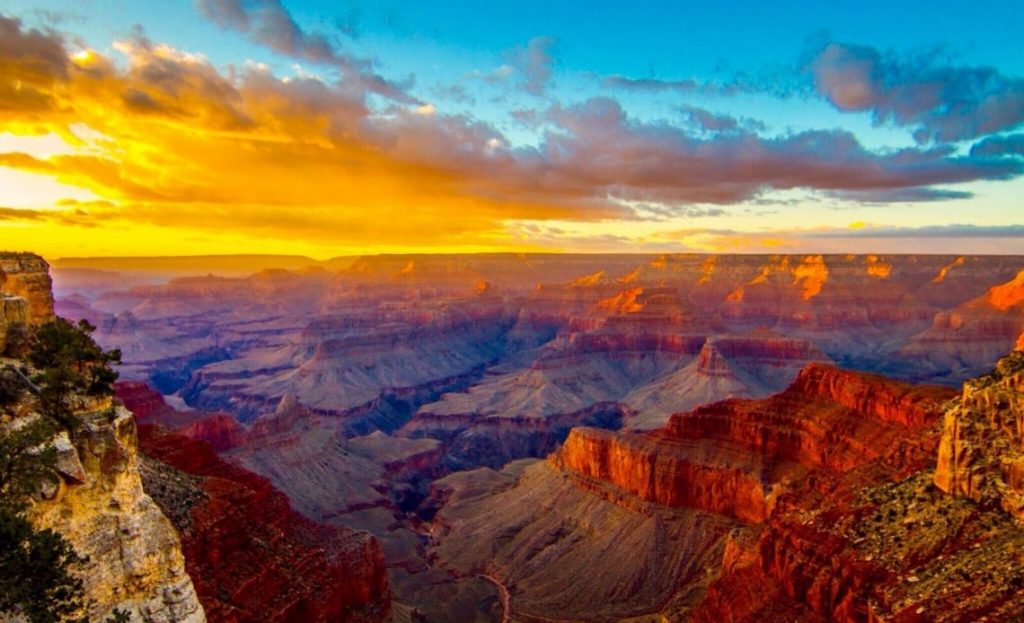
Arizona’s climate and natural beauty are as diverse as they are stunning, offering residents and visitors alike a unique blend of scenic wonders and sunshine. Here’s what to expect from the Grand Canyon State’s environment:
- Extreme Heat: With summer temperatures soaring as high as 120°F, Arizona’s heat can pose challenges for outdoor enthusiasts and result in increased energy bills due to cooling needs. Staying hydrated and seeking shade become essential practices during these sweltering months.
- Drought Conditions: Arizona is no stranger to drought, experiencing very few rainy days in some years. This aridity contributes to its expansive desert landscapes, which may not appeal to those accustomed to greener environments.
- Dust Storms: The state is also known for its haboobs, or dust storms, which can be quite intimidating, especially for newcomers. These natural events are a testament to Arizona’s dynamic climate.
Despite these challenges, Arizona is a treasure trove of natural beauty:
- Iconic Landscapes: The Grand Canyon, one of the seven natural wonders of the world, calls Arizona is one of Arizona’s brightest gems. This spectacular landmark is accompanied by other notable attractions such as the Colorado River, Havasupai Falls, and the majestic Monument Valley, offering breathtaking views and a connection to the earth’s ancient past.
- Biodiversity: The Sonoran Desert, one of North America’s wettest deserts, is lush with vegetation and teeming with wildlife like bobcats and coyotes, showcasing the state’s ecological diversity. Arizona also boasts a variety of vegetation and animal life from different ecological communities, including forests and grasslands.
- Stargazing: With less than eight inches of rainfall annually, Arizona offers clear skies for stargazing and has more certified Dark Sky destinations than any other state, making it an astronomer’s paradise.
- Outdoor Activities: The state’s varied climatic zones provide perfect conditions for a wide range of outdoor activities. From skiing in Flagstaff to golfing in Phoenix or Scottsdale, Arizona’s climate allows for diverse experiences, often possible within the same day. The best times for these activities are during the fall, winter, and spring when temperatures are more moderate.
Arizona’s natural beauty extends beyond the deserts to mountains, canyons, and forests, each offering its own array of outdoor activities. The state’s climate diversity, from semiarid to humid regions, and its rich tapestry of natural attractions not only draw tourists worldwide but also contributes significantly to the local economy. Whether you’re moving to Arizona for the benefits of living in AZ or simply exploring, the state’s environment is sure to leave a lasting impression.
Outdoor and Recreational Activities
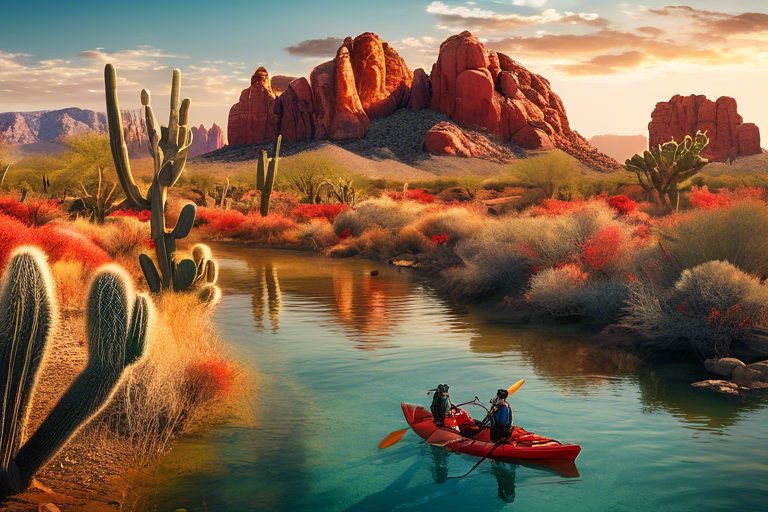
Arizona’s landscape is a playground for outdoor enthusiasts, offering a diverse range of activities that cater to all preferences and skill levels. Whether one seeks the thrill of adventure or the tranquility of nature, the state’s natural terrain provides ample opportunities.
- Hiking and Camping: For those drawn to the trails, Arizona is a hiker’s haven, with the Grand Canyon and Sedona’s Red Rock State Park offering some of the most iconic hikes. Camping enthusiasts can take advantage of developed campsites or venture into remote backcountry areas, with costs averaging between $15 to $30 per night for a truly immersive natural experience.
- Water Recreation: The state’s waterways are not to be overlooked. Fishing is a popular pastime in Arizona’s lakes, rivers, and streams, where a simple fishing license is all that’s needed to get started. For the more adventurous, the Grand Canyon National Park offers exhilarating rafting trips on the Colorado River, with options ranging from half-day jaunts to multi-day adventures.
- Equestrian and Off-Roading: Equestrian enthusiasts can trot along numerous trails in state parks and national forests, with Tonto and Coconino National Forests being among the favorites. Off-road aficionados have access to a plethora of trails, so that the thrill of the ride is just a decree away.
While the state’s climate and landscapes facilitate outdoor recreation year-round, residents must also be mindful of the natural inhabitants and weather patterns that could impact their activities:
- Wildlife Encounters: Arizona’s wilderness is home to various venomous creatures such as scorpions and tarantulas. While encounters can be unnerving, they are a part of the state’s diverse ecosystem and serve as a reminder to stay vigilant while enjoying the great outdoors.
- Weather Considerations: In addition to high temperatures, the monsoon season brings its own set of challenges, including flash flooding that can make driving treacherous. Such conditions necessitate caution and preparedness, such as carrying umbrellas and being aware of weather advisories during these seasonal changes.
Arizona’s climate also shapes its social life, with residents favoring outdoor activities during the cooler months and seeking indoor alternatives when the summer heat peaks. This cyclical pattern ensures that there’s always something to do, regardless of the season, fostering a vibrant social life influenced by the state’s beautiful, if occasionally challenging, environment.
Cost of Living in Arizona
Arizona’s cost of living varies by location within the state, though it’s safe to say that it’s generally more affordable than coastal regions like California. Before you pack your bags, it’s crucial to understand the true cost of living in AZ.
So let’s dive into housing affordability, everyday expenses, and tax considerations.
What’s the Average Cost of Living in Arizona?
According to the latest data from the U.S. Bureau of Economic Analysis, the average cost of living in Arizona is $50,123 per capita.
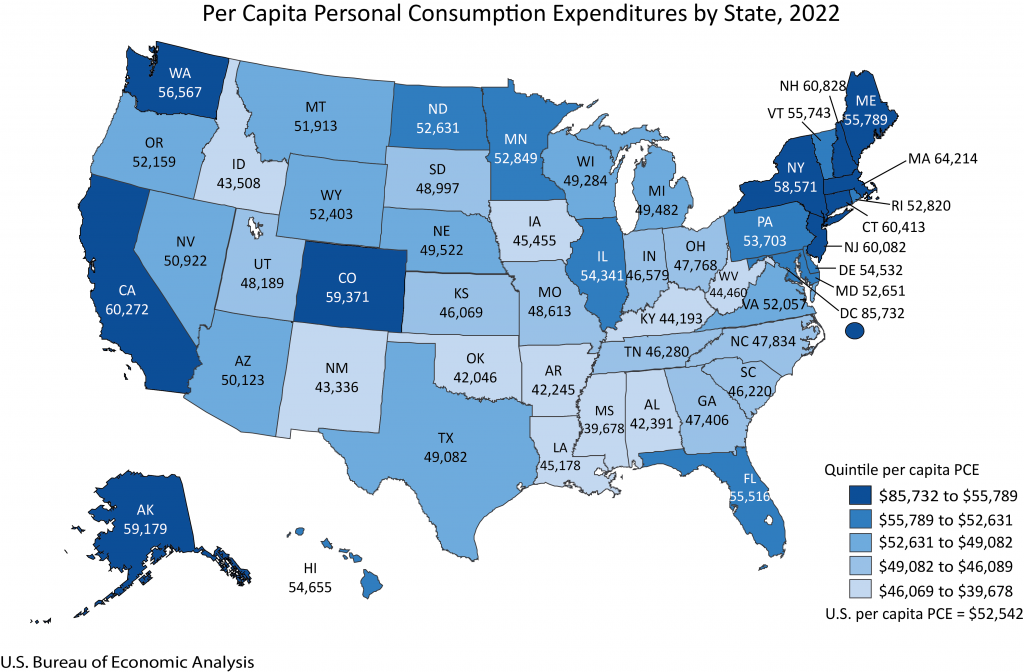
1. Housing Affordability: What to Expect When Searching for a House
No matter where you live, housing will likely take up a significant chunk of your budget. Here’s a breakdown of Arizona’s housing market:
- Overall Trend: While Arizona offers a generally more affordable housing market compared to coastal areas, prices vary greatly depending on location. Urban areas like Phoenix and Tucson tend to be more expensive, while rural areas offer more affordable options.
Resources for Overall Housing Market Trends:
- Arizona Realtors Association: publishes housing market reports like the “Arizona Housing Report” that analyze costs across regions.
- Redfin: provides data on Arizona’s housing market trends, including median sales price and sales volume.
Rent, Buy, or Build a Home in Arizona
Breakdown of the cost of living outlook for renting, buying, and building a home in Arizona:
Renting in Arizona:
- Pros: Flexibility, lower upfront costs, maintenance covered by landlord.
- Cons: Rent prices in Arizona are on the rise but are overall comparable to the national average, but renting means you won’t build equity.
- Outlook: Rents are expected to remain stable or see slight increases.
Buying in Arizona:
- Pros: Builds equity, potential for appreciation, tax benefits.
- Cons: Down payment required, ongoing maintenance costs, property taxes, homeowners insurance.
- Outlook: Home prices are expected to remain stable or see modest growth, with mortgage rates potentially impacting affordability.
Building a New Home in Arizona:
- Pros: Personalization, community amenities, builds equity, potential for appreciation, tax benefits, and potentially lower long-term costs (depending on materials and labor).
- Cons: Lengthy process, down payment required if you’re working with a home builder and if you’re building yourself there will be upfront costs of materials and labor, potential for delays and cost overruns, property taxes, and homeowners insurance.
- Outlook: Building costs may remain steady or can increase slightly due to material and labor costs, mortgage rates potentially impacting affordability.
While renting offers flexibility, homeownership can be a good long-term investment, but it’s crucial to factor in additional costs beyond the mortgage payment, such as property taxes, homeowners insurance, and home maintenance.
Beyond the initial purchase price, consider ongoing costs like:
- Property Taxes: Property taxes in Arizona are slightly below the national average, and vary by county and municipality.
- Homeowners Insurance: Homeowners insurance is mandatory for mortgage holders and provides financial protection in case of damage to your property. The cost of homeowners insurance depends on factors like location, property value, and coverage.
Rent, Buy, or Build a Home in Arizona: Making a Decision
Renting, buying, and building a home in Arizona all have advantages and disadvantages. The best choice depends on your individual circumstances, financial goals, and lifestyle preferences.
- Research Rental Costs: Look at rental listing websites like Zillow or Apartment List to understand current rental rates in your desired area.
- Explore Homeownership Options: Talk to a mortgage lender, homebuilder, or real estate agent to understand loan options and closing costs associated with buying or building a home in Arizona.
- Consider Long-Term Plans: Factor in how long you plan to stay in Arizona and your future financial goals when deciding between renting, buying, or building – but keep in mind that even if you buy, you can sell your home at any time.
Learn more: FHA vs Conventional Loans
By carefully considering these factors and conducting thorough research, you can make an informed decision about whether renting or buying is the right choice for you in the Arizona housing market.
2. Exploring the Costs: Utilities, Groceries, and Transportation
Beyond housing, everyday expenses play a role in your overall cost of living:
- Utilities: Utility costs can vary depending on your location and home size. Cost of electricity is typically lower in Arizona than the national average, and having an energy-efficient home can lower your costs even more, but you should expect higher electricity bills during the scorching summer months due to air conditioning use.
- Groceries: Grocery costs in Arizona are generally comparable to the national average. Farmers markets and local grocers offer opportunities to save on fresh produce.
- Transportation: Gas prices can fluctuate, but generally align with the national average. Public transportation options are limited outside major cities, so be sure to factor in car-related expenses like gas, insurance, and maintenance.
3. Tax Implications: State Taxes and Property Taxes in Arizona
Taxes can significantly impact your disposable income:
- Federal Income Tax: Of course, your federal income tax will be the same no matter which state you live in. But it’s worth keeping in mind that if you choose to buy, homeownership can offer a variety of tax benefits.
- State Income Tax: Arizona has a flat income tax rate (2.5% in 2023), which can be beneficial for some taxpayers. However, it’s important to consider other state and local taxes that may apply.
- Property Taxes: As mentioned earlier, property taxes in Arizona vary by county and municipality. Research property tax rates in your desired area to factor them into your housing budget.
- Sales Tax: The state sales tax in Arizona is 5.6% (2023), with the option for localities to add additional sales taxes.
Budgeting for Life in Arizona
Understanding Arizona’s cost of living structure empowers you to create a realistic budget. While housing can be affordable compared to some areas, factor in rising rents and potential fluctuations in utilities.
Research specific costs in your chosen location, considering groceries, transportation, and taxes, to get a clear picture of your monthly expenses.
By researching housing markets, budgeting for utilities and groceries, and considering tax implications, you can make a sound decision about whether the Grand Canyon State aligns with your financial goals and lifestyle aspirations.
Additional Cost of Living Resource:
Job Market and Economic Opportunities
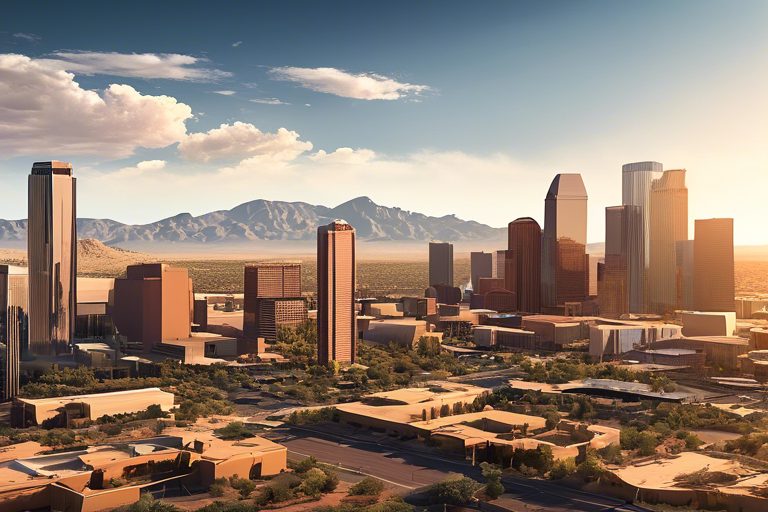
Arizona’s job market presents a landscape of both opportunities and challenges, reflective of its diverse economy. Here’s a snapshot of the current economic situation:
Job Market Dynamics:
- Sector Reliance: The economy leans on sectors like tourism, agriculture, and technology. This concentration means that opportunities are abundant in these areas, but may be limited in others, potentially affecting those seeking a broader spectrum of industry options.
- Economic Growth: Arizona’s economy is on an upward trajectory, with a projected growth of 1.6% in 2024; projected employment growth falls along the same lines, at 1.5%.Arizona’s economy is on an upward trajectory, with a projected growth of 1.6% in 2024.
Employment Trends:
- Unemployment Projections: The unemployment rate may tick upwards as global economic headwinds affect the tourism sector. Yet, personal income growth is expected to follow along with the national average, indicating resilience in the face of economic shifts.
- Population Growth Impact: While population growth is anticipated to slow, Arizona will continue to outpace much of the U.S., driven by factors like the mild winters and generally affordable housing, which contribute to Arizona being seen as a good place to live.
- Job Sector Slowdowns: Despite adding 9,200 nonfarm jobs in December, there’s a noticeable deceleration in job growth in some areas. The manufacturing sector, in particular, has seen a reduction in workforce numbers, emphasizing the necessity for economic diversification and the development of new growth sectors.
Wages and Historical Economic Shapers:
- Wage Growth: Average hourly wages have seen an uptick, yet inflation has eroded real wage gains. This highlights the importance of economic strategies that address living costs and wage sustainability.
- Historical Influencers: The state’s economy has been shaped by significant events, such as the advent of the railroad and the construction of major dams. These historical milestones have transformed cities like Phoenix, laying the groundwork for a modern economy that is robust in sectors like defense, tech, healthcare, manufacturing, and aerospace.
Economic Size and Diversity:
- Gross State Product: With a gross state product rivaling that of entire countries, Arizona’s economy is formidable and continues to offer opportunities across various industries, from healthcare to education and technology.
Arizona life is shaped by an evolving job market and economic opportunities that reflect the state’s historical growth, current industry strengths, and future potential. While there are challenges such as sector concentration and educational gaps, the economic outlook remains positive, with the state’s growth outpacing many others. As such, for those considering reasons to move to Arizona, the economic landscape offers a mix of stability and potential for those willing to navigate its unique terrain.
Safety in Arizona
Staying safe is essential for any visitor or resident of Arizona. Understanding safety considerations is crucial for an enjoyable experience. From crime rates, to weather and Arizona’s unique desert landscape, let’s explore some key aspects of safety in Arizona:
- Crime Rates: Arizona’s crime rates are mixed. While some reports show property and violent crime rates are lower than the national average, others indicate higher rates depending on the source.
- Safest Cities: Several Arizona cities rank highly in safety surveys, with Gilbert and Maricopa ranking as some of the state’s safest.
- Neighborhood Matters: Like most places, crime rates can vary greatly within Arizona cities and towns. Research specific neighborhoods to understand their safety statistics.
General Safety Considerations:
- Summer Heat: Arizona’s scorching summers can pose health risks, especially for those not acclimated. Stay hydrated, avoid strenuous activity during peak heat hours, and be aware of heat stroke symptoms. Take precautions to stay cool and hydrated during peak temperatures.
- Desert Environment: Be mindful of the desert landscape. Flash floods can occur during monsoon season, and wild animals like rattlesnakes are present. Be prepared with an emergency plan and stay informed about potential threats.
By being aware of Arizona’s unique characteristics, from potential weather hazards to diverse wildlife, you can make informed decisions and ensure a safe and enjoyable experience in the Grand Canyon State.
Cultural and Social Life

Arizona’s social and cultural landscape is as varied and colorful as its famous sunsets, offering a vibrant tapestry that weaves together the traditions of its diverse inhabitants. Here’s a glimpse into the cultural and social life that contributes to the debate on whether Arizona is a good place to live:
- Diverse Cultural Influences: The cultural life in Arizona is a rich mosaic influenced by Native American, Mexican, and Western American traditions. This diversity is celebrated through a variety of festivals, culinary offerings, and artistic expressions that are integral to the state’s identity. From the spirited dances of the 22 Native American tribes to the lively Mexican-American celebrations like Cinco de Mayo, Arizona’s cultural scene is a dynamic and inclusive space for all to enjoy.
- Historical Echoes: Arizona’s history is etched into its very landscape, with modern buildings standing alongside ancient Indian society ruins, ghost towns, and remnants of the Cold War era. The Spanish influence is particularly prominent, with historical landmarks such as the San Xavier del Bac Mission and Tucson’s presidio garrison, which echo the state’s past under Mexican control following its independence in 1821.
- A Social Hub: Cities like Phoenix and Tucson are the beating heart of Arizona’s social life, offering an array of nightlife options, culinary delights, and cultural attractions. Museums, art galleries, and theaters abound, providing residents and visitors with a plethora of activities to enrich their social experiences. These cities serve as hubs for engaging with the arts, indulging in diverse dining scenes, and participating in a variety of community events.
Arizona’s rich cultural and social offerings present an overall feeling of inclusivity and celebration of its unique heritage. These aspects of Arizona life are not only reasons to move to AZ but also key factors that contribute to the overall perception of Arizona living. Whether attending a cowboy festival, exploring a Native American art exhibit, or enjoying a Mexican feast, the cultural and social life in Arizona is a testament to its multifaceted community.
To sum it all up, the cultural and social life in Arizona is a vibrant and integral part of what makes the state an interesting and potentially rewarding place to call home. From the echoes of its diverse historical influences to the contemporary celebrations of its many cultures, Arizona offers a rich tapestry of experiences that contribute to the perks of living in AZ.
Benefits of Buying a New Construction Home in Arizona
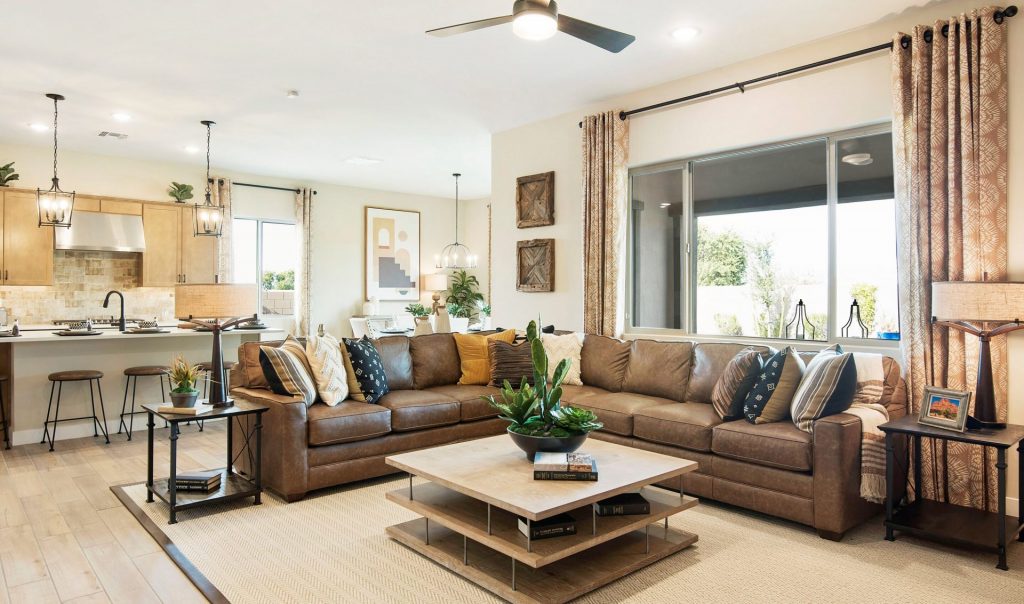
Now that you’re getting to know the Grand Canyon State, let’s talk about the benefits of buying a new construction home in Arizona.
Arizona’s sunny skies and beautiful landscapes make it a desirable location for many, and buying a new construction home in the state offers a unique set of advantages. Here are a few reasons to consider a brand-new build for your Arizona dream:
- Modern Design, Amenities, and Energy Efficiency: The majority of new construction homes are built with the latest trends and technologies in mind, often featuring open floorplans, energy-efficient appliances, and sustainable materials. This can translate to lower utility bills and a more comfortable living environment, which is great news for Arizona.
- Safety-Tested Against Elements: New construction homes undergo final inspection prior to getting the green light for move-in, to ensure absolute safety for you and your loved ones. Rest easy knowing your new home is up to date with the latest safety codes and regulations.
- Personalization Options: While opportunities for personalization will vary from builder to builder and home to home, new construction typically gives you more chances to personalize certain aspects of your home, such as floorplans, finishes, and fixtures. This is beneficial because you can craft a unique home best suited to your personal style, making your abode stand out from the others around you.
- Lower Maintenance Needs: New homes in Arizona typically require less maintenance in the initial years compared to older properties. Builders often provide warranties on major systems, and the overall wear and tear will be minimal. This can save you money and time on repairs and upkeep.
- Modern Conveniences: Included features in new construction homes can make life that much easier, and enhance your preferred lifestyle. Our new builds in Arizona often feature conveniences like LED lighting and landscaping with drip irrigation. You can also indulge in smart home systems as technology continues to evolve – popular options include security systems, thermostats, lighting, garage doors, automatic blinds, and more!
- Move-in Ready Convenience: Unlike older homes that might require renovations or repairs, you can often find new construction homes that are move-in ready, allowing you to settle in quickly and comfortably without the hassle of unexpected issues.
- Part of a Community: Whether you want to live in a family friendly, gated, golf, or 55+ communities, new home communities give you the opportunity to meet likeminded neighbors and friends. The best part of life can be the connections we make with others, and moving into a new construction community can help foster a greater sense of belonging, especially if you’re new to the Arizona area.
- Community Amenities: Many new construction communities in Arizona are designed with community living in mind. These communities often feature amenities like pools, parks, clubhouses, and even fitness centers, helping foster a sense of connection and offering residents a variety of recreational options.
- Potential for Increased Value: While the Arizona housing market can fluctuate, new construction homes often appreciate in value over time due to their modern features, energy efficiency, and desirable locations. Buying a new home in Arizona could potentially be a smart investment for the future, particularly if you plan to stay in the home for a long period. As the surrounding area develops and matures, the value of your property may potentially appreciate.
Things to Consider with New Construction Homes:
- New Construction Wait Times: Building a new home can take several months, or more requiring patience and flexibility during the construction process.
- Limited inventory: Due to demand and depending on the area, the selection of available new construction homes might be smaller compared to the pre-owned market.
- Maturity of the Neighborhood: Since it’s new construction, depending on the age of the community, the surrounding area might not be fully established, landscaping or additional amenities may still be in the works.
Ultimately, choosing between a new construction and a pre-owned home depends on your priorities. If you value a modern, low-maintenance home with the latest features, a brand-new construction in Arizona could be a great choice. But if you prefer a more established neighborhood and are okay with putting in some work on an older home, a pre-existing property might be a better fit.
So, Is Arizona a Good Place to Live?
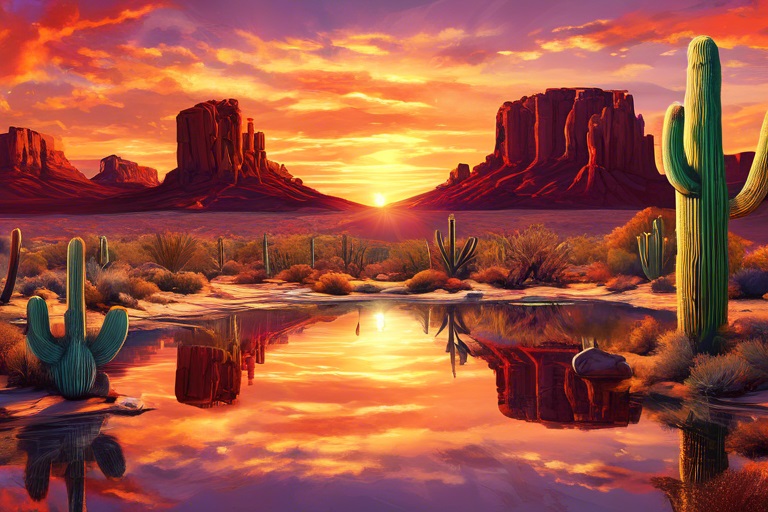
If you love sunshine, outdoor activities, and a slower pace of life, Arizona might be perfect. However, if you struggle with extreme heat or prefer lush greenery, it might not be the best choice.
But determining if Arizona is a good place to live ultimately hinges on individual preferences and priorities. Taking into account the pros and cons, here’s a closer look at some aspects that might influence your decision:
- Lifestyle Preferences: The state’s vast array of outdoor activities and warm climate cater to those who love adventure and sunny days. However, for those sensitive to heat or with certain health conditions, the high summer temperatures could be a significant deterrent. Understanding your lifestyle needs will help you decide if the Arizona life aligns with your personal comfort and interests.
- Economic Opportunities: With a robust job market, Arizona can be a land of opportunity for professionals in healthcare, tech, and finance. That said, it’s important to balance this with the current state of the real estate market and the cost of utilities. Prospective residents should consider if the employment opportunities outweigh the expenses associated with living in the state.
- Adaptability to Environment: Unique environmental factors such as dust storms and the presence of venomous wildlife require a certain level of adaptability. If you’re someone who enjoys a dynamic environment and can take precautions, then the perks of living in Arizona may outweigh these concerns.
Weighing the benefits of living in Arizona against the challenges will provide a clearer picture of what life in the state entails. It’s crucial to consider your own circumstances and preferences in the context of the Arizona living experience to make an informed choice about living in Arizona.
When all is said and done, living in Arizona offers a blend of natural beauty, urban amenities, and a laid-back southwestern lifestyle. And even if you’re not too keen on hotter temperatures, you’ll love the crisp breeze of a strong air conditioner as soon as you head into your car, home, or any indoor area.
Whether you’re seeking a modern masterpiece in a bustling city or a serene retreat in the foothills, K. Hovnanian offers a diverse range of new homes in Arizona to match your lifestyle and budget.
Living in Arizona F.A.Q’s
K. Hovnanian New Construction Homes in Arizona
Ready to come home to scenic desert views? Check out our new construction homes across Arizona, including Northwest Valley, Phoenix, Scottsdale, Southeast & Southwest Valley for picture perfect living. We know you and your loved ones will enjoy growing in a spacious and affordable home.
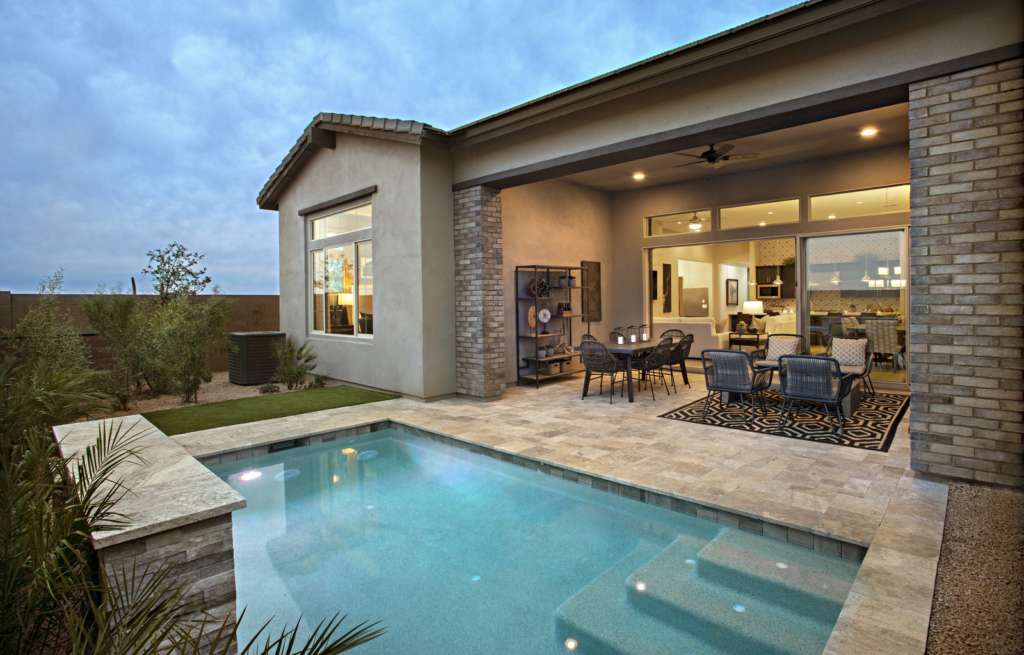
Our homes feature designer kitchens with GE® ENERGY STAR® stainless steel appliances, relaxing modern baths, luxurious interiors with LED lighting, and convenient exterior features like covered patios.
A handful of our homes include Looks, our unique interior design collections curated by our team of professionals. You’ll have the opportunity to select your preferred style for a more personalized and elevated home with cohesive and harmonious interior finishes.
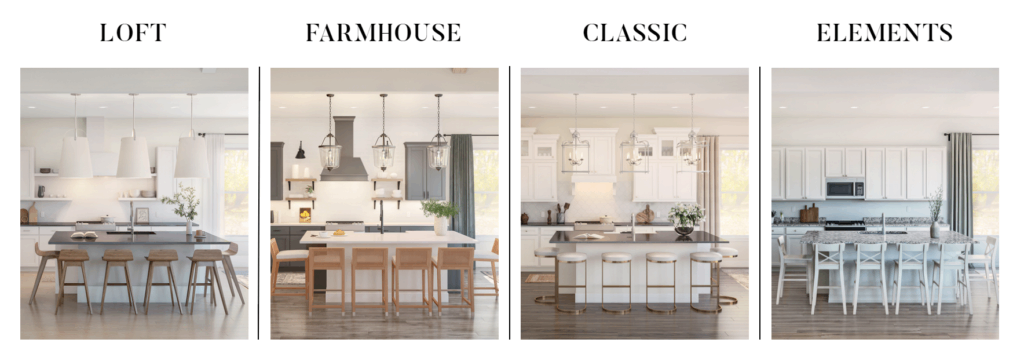
Learn more: A Guide to the New Construction Home Process
Another popular option we offer is the Extra Suite and Extra Suite Plus. This option is a perfect addition to a home for multi-generational living, adult children moving back home, live-in au pairs, housing guests during extended stays, and more.
Cherish the sense of community you’ll have enjoying amenities like a barbeque Ramada to host family parties, a pool to enjoy with neighbors, and a tot lot for the kids to create friendships.
Our new home communities in Arizona are located near everyday conveniences, commuter routes, fantastic schools, employment opportunities, and outdoor recreation.
Ready to start your new life in Arizona? Visit K. Hovnanian Homes and browse our selection of new construction homes in Arizona today and find the perfect home for you. With a wide variety of styles and floor plans to choose from, we’re sure you’ll find the perfect home for your needs and budget. And with our convenient location and amenities, you’ll be able to enjoy all that Arizona has to offer.
Want to learn more? Contact Us Today or use our home search to Find a K. Hovnanian Community near you!
Last Updated on April 25, 2024
